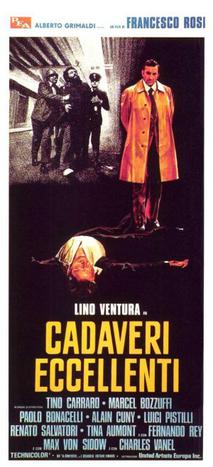Plot
The film starts with the murder of Investigating Judge Vargas in Palermo, amongst a climate of demonstrations, strikes and political tension between the Left and the Christian Democratic government. The police assign Inspector Rogas to solve the case. While he is starting his investigation, two more judges are killed. All victims turn out to have worked together on several cases. After Rogas discovers evidence of corruption surrounding the three government officials, his superiors advise him "not to forage after gossip," but to trail the "crazy lunatic who for no reason whatever is going about murdering judges."
Rogas seeks out three men wrongfully convicted by the murdered judges, and finds his likely suspect in Cres, a pharmacist who was convicted of attempting to poison his wife. Rogas concludes that he was probably framed by his wife. During a search of his house Rogas learns that Cres has not only disappeared but that all pictures of him have his face cut out. Meanwhile, a fourth investigating judge is killed. Upon leaving the site of the murder, Rogas runs into his friend from schooldays, Cusan, who writes for a far-left newspaper. Although the two men have diverging political views, Cusan expresses his respect for the sincerity and strictness of Rogas' investigations.
After a fifth killing in front of the Justice Building, the two main eyewitnesses, a policeman and a prostitute, report having seen two young revolutionaries run away from the scene and a car speeding off afterwards. Other than the policeman's recount, who states that the young men fled in the car, the prostitute insists that the men and the car left in different directions. Rogas is demoted and told to work with the political division to pin the crimes on the revolutionary Leftist terrorist groups.
Rogas seeks out the Supreme Court's president Riches in order to warn him that he is most likely the next victim. On his first visit, he spots several high-ranking government officials in their cars, including the car which the prostitute had described. Riches details to Rogas a philosophy of justice wherein the court is incapable of error by definition. At a party in the same building, held by shipping tycoon and prominent Christian Democracy member Pattos, Rogas discovers the Minister of Justice with many prominent representatives of the political Left, amongst them the editor of the revolutionary paper Cusan is working for, Galano. He and the Minister have a discussion where the latter reveals that sooner or later, his party will have to form a coalition with the Communist Party, and that it will be their task to prosecute the far-leftist groups. Rogas spots a man whom he believes to be his suspect Cres, but when he wants to approach him, the man has disappeared. After leaving, Rogas is being followed.
Rogas asks his friend, a police commissary and surveillance expert, to place a bug in the office of the Chief of Police. On one of the phone recordings, the Chief of Police advises his anonymous listener to "take it easy on the judges" for the time being because of Rogas' investigations. Rogas concludes that the first murders of the judges were carried out by Cres and that the subsequent murders were ordered to justify the prosecution of the far-left groups. He explains his theory to Cusan who, after initial doubts, proposes to Rogas to speak to Amar, the Secretary-General of the Communist Party. Without their knowledge, their conversation has been followed by Riches with a hidden microphone. After listening to the conversation, Riches is shot like the other judges.
Rogas discovers that his phone is tapped. He meets with Amar, the Secretary-General of the Communist Party, in a museum, where both of them are killed. Amongst rising tensions between revolutionaries and the government, which mobilizes the army, the Chief of Police reads a statement which blames the killing of Amar on the mentally unstable Rogas, who committed suicide after the murder. The film ends with a discussion between Cusan and the vice-secretary of the Communist Party. The latter declares that the party will accept the government's official version of the murders to prevent an open confrontation which could be carried out into the streets. "But then the people must never know the truth?", asks Cusan. The vice-secretary answers: "Truth is not always revolutionary."
